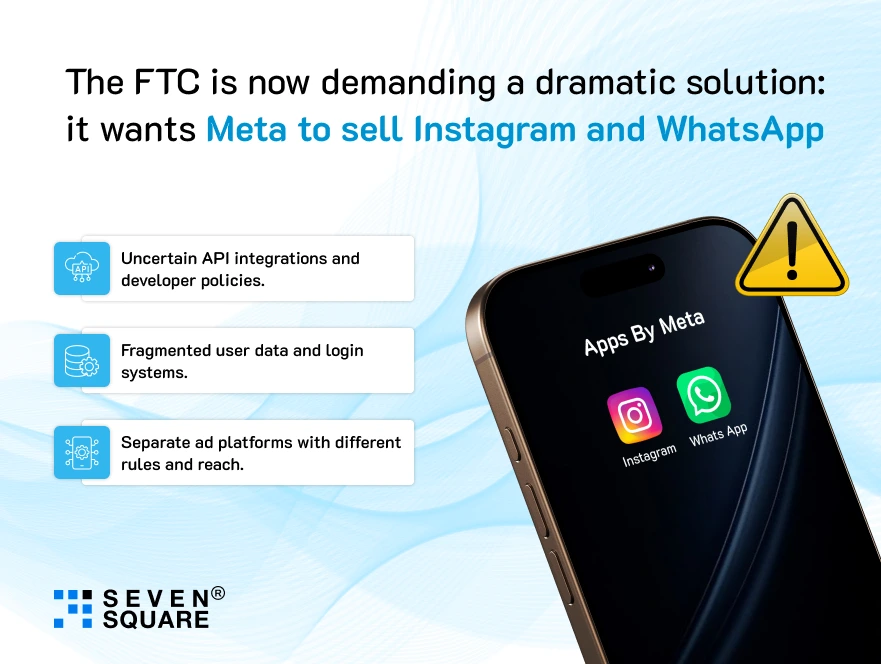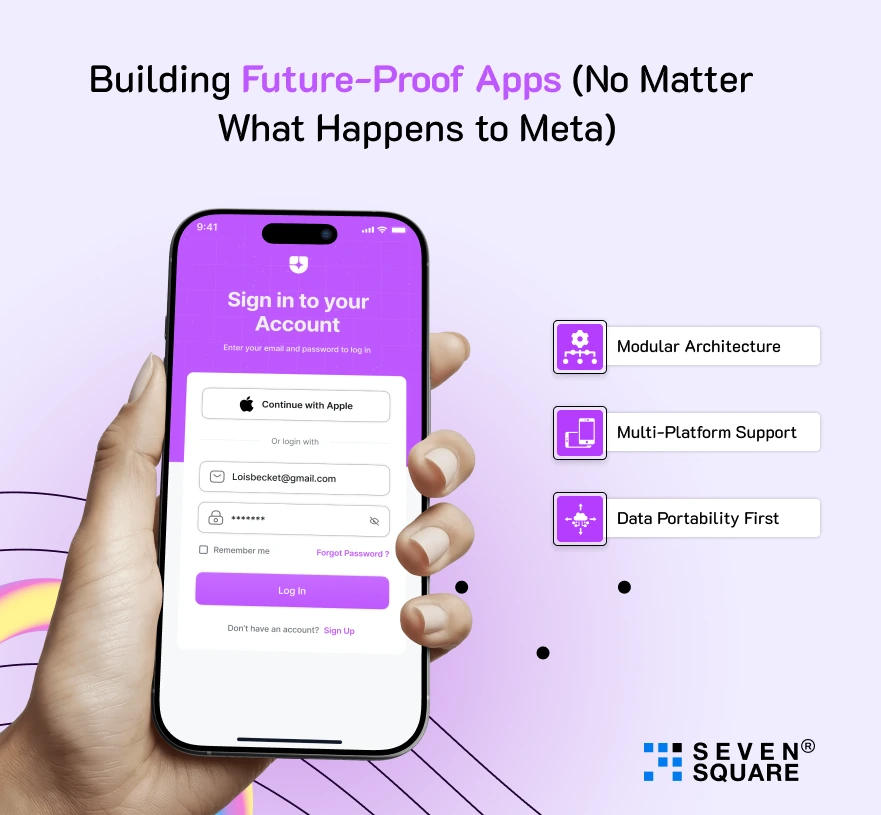“What happens when the giants fall? App developers need to pay attention.”
The FTC vs. Meta case is more than just a legal headline, and it could be one of the most important turning points in the history of the tech industry.
The Federal Trade Commission is taking a bold step to break up Meta’s dominance by pushing the company to sell Instagram and WhatsApp & claiming these acquisitions were made to crush competition.
For most users, it’s just news.
But for us, the developers, designers, and teams behind thousands of apps that depend upon Meta’s infrastructure, this lawsuit could change everything.
Meta’s platforms have long been central to how we build, market, and monetize apps.
Think about it: social login APIs, advertising networks, audience targeting tools, Facebook SDKs, and Instagram integrations are part of the backbone for many mobile and web apps.
The FTC’s case against Meta is about control, dependency, and the risk of building on platforms that may not remain stable, unified, or even open.
If Meta is forced to break up, the ripple effect on developers could be massive, affecting everything from API access and user reach to ad pricing and platform policies.
In short: This lawsuit isn’t just Meta’s problem. It’s ours too.
This blog will break down what’s happening, why it matters for developers, and how we who build apps across industries are preparing for what comes next.
The Case Unpacked: FTC’s Push to Break Meta’s Monopoly
The FTC’s case against Meta started getting momentum in late 2020.
The Federal Trade Commission filed a lawsuit claiming that Meta (Facebook) had built a social media monopoly by acquiring rivals like Instagram in 2012 and WhatsApp in 2014.
These weren’t just business deals, according to the FTC they were strategic moves to eliminate competition before it could grow.
From a developer’s point of view, this accusation hits hard. We often look to big platforms as stable foundations for building user-centric apps.
But if those foundations were built by crushing competition, we’re not innovating within a healthy ecosystem but we’re trapped in it.
This Meta monopoly case is part of a bigger wave of Big Tech antitrust lawsuits across the U.S. and Europe.
Regulators are questioning whether tech giants have become too powerful, and whether their dominance is hurting both innovation and smaller players like independent app developers.
The FTC is now demanding a dramatic solution: it wants Meta to sell Instagram and WhatsApp.

If that happens, it could lead to:
- Uncertain API integrations and developer policies.
- Fragmented user data and login systems.
- Separate ad platforms with different rules and reach.
For developers, that’s a potential nightmare or a fresh opportunity, depending on how we prepare for it.
Meta’s Defense: “We’re Just Innovating” or “Killing Competition”?
Meta isn’t staying silent in this fight.
In the ongoing Meta antitrust trial, the company argues that its success comes not from crushing competitors, but from building better products.
Their message to the court is simple: “We didn’t cheat, we innovated.”
According to Meta, the acquisitions of Instagram and WhatsApp were legal, reviewed at the time, and helped improve user experiences.
They claim these platforms became what they are today thanks to Meta’s investment, engineering, and scaling efforts not because of any underhanded tactics.
But from a developer’s perspective, the line between innovation and domination isn’t always clear.
Yes, Meta provides powerful tools for app integration, marketing, and monetization. But their track record also includes:
- Cutting off access to APIs without warning.
- Favoring their own products over third-party apps.
- Quickly cloning features from up-and-coming competitors.
These behaviors are exactly what the FTC is calling Meta’s anticompetitive practices.
And developers have felt the pressure. Many of us have built products around Meta’s ecosystem, only to pivot or start over when policies changed overnight.
That’s why the current Meta acquisitions matter so much.
If these platforms were gained through unfair practices, then the very foundation many apps depend upon is unstable.
As developers, we’re not just watching this trial but we’re living its consequences.
So the question remains: is Meta really just innovating, or has it been strategically killing competition in ways that hurt smaller players?
Why This Matters for App Developers: A Tectonic Change in Platform Power?
For years, many app developers have depended heavily upon Meta’s platforms like Facebook, Instagram, and WhatsApp for everything from social logins to ad targeting.
These tools have made it easier (and faster) to build and grow apps at scale.
But here’s the catch: when one company controls so many key platforms, developers become dependent on its rules and its stability.
Now, with the FTC vs Meta case heating up and the possibility that Meta might be forced to sell Instagram and WhatsApp, that stability is being shaken.
So, what app developers should know about FTC vs Meta is this: if the breakup happens, we’re looking at a major platform power shift that could change how our apps work and how we build them.
What Could Change?
- APIs you rely on might be split between different companies.
- Cross-platform integrations (like unified logins or analytics) could break.
- Ad networks and data pipelines might become more expensive or less effective.
- Platform policies could change & add more work for devs managing multiple versions.
If you’re wondering how the FTC’s case affects app developers, the answer isn’t simple. It’s both a risk and a rare opportunity to rethink where and how we build.
Lessons from Meta’s Monopoly Case: How We Future-Proof the Apps We Build?
At Seven Square, we work closely with startups and product teams.
We are watching the FTC vs Meta case not just as news but as a signal to rethink how apps are built.
With the uncertain future of Instagram and WhatsApp because of the FTC lawsuit, we’re advising our clients to stop depending upon platforms owned by a single tech giant.
Learn more about the uncertain future of TikTok.
So what are we doing about it?
Building Future-Proof Apps (No Matter What Happens to Meta)

1. Modular Architecture
- We design apps where key features are loosely coupled, so if a platform changes or disappears, the entire app doesn’t collapse.
- This makes it easier to change services, such as social logins and messaging APIs, without starting from scratch.
2. Multi-Platform Support:
- Instead of relying solely on Facebook or Instagram, we integrate with alternative tools like Apple Sign-In, Google Identity, or open protocols like OAuth and ActivityPub.
3. Data Portability First:
- Your app’s users and their data should be yours to manage & not trapped inside a third-party platform.
- We always design with data portability in mind, so clients can scale or switch ecosystems easily.
Worried About Platform Dependency? Let’s Build Something Together!
Meta’s Fall, Your Rise: New Doors for Developers
Big shakeups mean big openings.
And if the FTC succeeds in breaking up Meta’s monopoly, this could be one of the most important moments for independent developers in over a decade.
If the court rules against Meta, the consequences of Meta’s monopolistic behavior won’t just be legal fines or headlines; they’ll change the digital industry.
Developers who’ve been building under the shadow of Meta’s platforms may finally have space to grow without being copied, crushed, or controlled.
What Could This Look Like?
- Social platforms are gaining users who are tired of centralized control.
- More ethical and developer-friendly ad networks are entering the market.
- Open standards, such as ActivityPub (used by Mastodon), are becoming viable alternatives to closed APIs.
- A renewed push for decentralized protocols, user-owned data, and peer-to-peer features.
So, as app developers, let’s lead.
Let’s design with openness in mind, explore new frameworks, and create products that don’t depend on a single gatekeeper.
FAQs
- The FTC claims that Meta’s acquisitions were done to suppress competition and maintain its market dominance.
- By owning Instagram and WhatsApp, Meta has eliminated potential rivals and created barriers for new players in the social media space.
- Meta’s monopolistic behavior has discouraged competition & made it harder for startups to scale independently, and left developers dependent upon a single ecosystem.
- The case could change the way for more open innovation and developer-friendly alternatives.
- Yes. It is wise to reduce platform dependency by using modular app architecture, supporting multi-platform integrations, and building independent distribution channels.
- This makes apps more flexible in case of regulatory or ecosystem changes.
- This is one of the most aggressive Big Tech antitrust lawsuits in the United States in recent years, comparable in scope to past actions against Microsoft and Google.
- It shows increasing regulatory scrutiny across the entire tech industry.
- That’s still undecided. The case is ongoing, and the courts will determine whether Meta’s acquisitions were anti-competitive and if a breakup is legally justified.
- Developers should stay informed and plan for both outcomes.